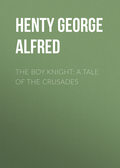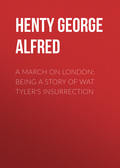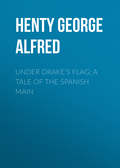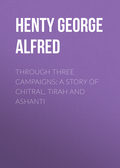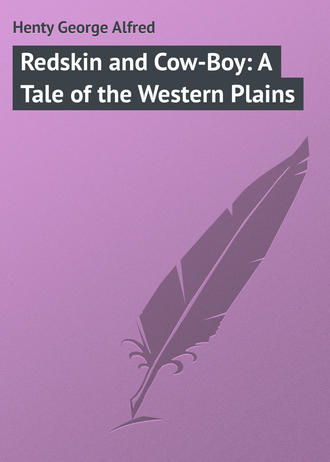
Henty George Alfred
Redskin and Cow-Boy: A Tale of the Western Plains
They therefore rode with the caravan, and aided it as far as they could. The waggons, which were of great size, were generally drawn by twelve oxen or mules, and in crossing the deep sand it was sometimes necessary to use the teams of two waggons to drag one over the sand-hills. Sometimes even this failed to move them, and the mounted men fastened their ropes to the spokes of the wheels, and so helped to get the waggons out of the holes into which they had sunk.
"I would rather run the risks of a fight with the Indians," Hugh said to Royce on the last day of their journey across the plain, "than have to perform this frightful journey. The heat is simply awful, and I feel as if I could drink a bucket of water."
"You will get plenty of water to-night, Hugh. The Pecos is a good big river. I believe the animals smell it already. Look how hard they are pulling. The drivers crack their whips and shout as usual, but the beasts are doing their best without that. We have been very lucky that we have had no sand-storms or anything to delay us and confuse us as to the track. Waal, we are over the worst of the journey now; except the Guadalupe Pass there ain't much trouble between the Pecos and El Paso. Once there we are on the Rio Grande all the way up to Santa Fé."
Towards the afternoon the ground became harder, and the animals quickened their pace almost to a trot, straining at the ropes with heaving flanks, while their tongues hanging out and their blood-shot eyes showed how they were suffering. An hour before sunset a shout broke from the men as, on ascending a slight rise, the river lay before them. The instant they reached its bank and the animals were loosed, they rushed in a body into the stream and plunged their nostrils deeply into the water, while the men, ascending the banks a short distance, lay down at the edge of the stream and satisfied their thirst. Five minutes later all had stripped and were enjoying a bath.
Hugh had been much struck with the difference between the teamsters and the cow-boys; the former did not wear the chaperajos or leather overalls with fringed seams, or the bright silk neck handkerchiefs or flat-brimmed hats of the cow-boys. Their attire was sober rather than bright. They wore soft hats, with slouched brims, and great cow-hide boots. There was none of that dashing, reckless air that characterized the cow-boys, or the quick alertness that showed the readiness to cope with any emergency that might occur. Nor in the camp at night was there any trace of the light-hearted gaiety which showed itself in song, laughter, and dance in the gatherings round the cow-boys' fires. They were for the most part silent and moody men, as if the dull and monotonous labour in which they were engaged, and the months of solitary journeying, with nothing to break the silence save the cracking of the whips and the shouts of encouragement to the animals, had left their mark upon them. Hugh and Royce agreed cordially that, with all its dangers and its unmeasured toil, they would infinitely prefer the life of a cow-boy, short as it might be, to that of a teamster, even with the prospect of acquiring a competence upon which to settle down in old age.
Two days' halt was made on the banks of the Pecos to rest the foot-sore animals. Then the journey was recommenced, the river crossed at a shallow ford, and its banks followed until, after three days' journey, a small stream running in from the west was reached. Hence the route lay due west to El Paso. The country was flat until they reached the Guadalupe range of hills, which they crossed by a winding and difficult pass, each waggon being taken up by three teams. Then skirting the Alimos Hills they crossed the Sierra Hueco by the pass of the same name, which was far easier than that of Guadalupe, and then one long day's march took them down to Fort Bliss, which stands on the Rio Grande, facing the town of El Paso. They had now arrived at the borders of civilization. Mexican villages and towns, and United States posts were scattered thickly along the course of the river all the way from El Paso up to Santa Fé.
"What air you thinking of doing, young fellow?" the head of the party asked Hugh as they sat by the fire of the encampment a short distance out of El Paso. "You see we shall kinder break up here. I go with my teams to the forts along the river, and then strike out east to the outlying posts. About half my freight is ammunition and such like. Waal, then, pretty nigh half the waggons go up to the mines. They have powder, tools, and machinery. One or two stay here. They bring hardware and store goods of all sorts for this town; the rest go up to Santa Fé. Now what air you thinking of doing? You can make up your mind to stay here, or you kin go up to Santa Fé. You told me you had a fancy for jinin' some prospecting party and going out west into Arizona. I doubt whether you will find anyone much bent on that job at present, seeing as how the Injuns is stirring, though I don't know that makes much difference, seeing they is always agin anyone going into what they calls their country.
"Anyhow, the miners will all have to work with a pick in one hand and a rifle in the other. You have got the Apaches here, and they air wuss than the Comanches. The Comanches have had to deal with western hunters and pioneers, and know that there ain't much to be got out of them but lead, so beyond stealing cattle they've got into the way of being mostly quiet, though now and agin they break out, just as they have at present. Now the Apache has had to deal all along with Mexicans, and he has pretty good reason for thinking that he is a much better fighter than the white man. He has been raiding on the Mexican villages for hundreds of years, burning and killing and carrying off their women and gals, and I guess thar is a pretty good sprinkling of Mexican blood in his veins, though that don't make him better or wuss, as far as I know. Still, take them altogether, they air the savagest and hardest tribe of Red-skins on this continent.
"However, if you like to go prospecting among thar hills and to run the risk of losing your scalp, that is your business; but if you do, this is the place to start from, and not Santa Fé. There is gold pretty nigh everywhere in the valley of the Gila, and that lies a bit to the north-west from here. At any rate, it seems to me that this is the place that you are most likely to fall in with parties starting out. But let me give you a warning, lad. You will find this town is pretty nigh full of gold-miners, and you won't find one of them who won't tell you that he knows of some place that's a sartin fortune up among the hills. Now, don't you believe them. Don't you go and put your money into any job like that. If you find a party being got up, and others think it good enough to jine, of course you can chip in, but don't you go and find the money for the whole show."
"There is no fear of that," Hugh laughed. "I had about five-and-twenty pounds when I went on to the ranche, and I have got that and six months' pay in my belt. That won't go far towards fitting out an expedition."
"No, it won't," the teamster agreed. "It will be enough for you to be able to chip in with the others, but, as you say, not to stand the whole racket. Waal, what do you think?"
"I am very much obliged to you for your advice," Hugh said, "and I think we can't do better than stay about here for a bit at any rate. What do you say, Royce?"
"It is all one to me," Royce replied; "but there is no doubt that El Paso is as good a place as any, if not better, for looking round."
"Then that is settled, Bill; and to tell you the truth, I have had pretty nigh enough riding for the present, and sha'n't be sorry for a fortnight's rest."
"Same here," Bill said. "I feel as if I was getting part of the horse, and should like to get about on foot for a bit so as to feel that I hadn't quite lost the use of my legs."
Accordingly the next morning they bade good-bye to their comrades of the last two months, and mounting, rode into El Paso.
It was a town of some size, and purely Mexican in its features and appearance. The inhabitants almost all belonged to that nationality, but in the street were a considerable number of red-shirted miners and teamsters. Hugh and his companions rode to one of the principal haciendas, and handed over the three horses to a lounging Mexican.
"They have been fed this morning," Royce said. "We will come in and give them some corn in two hours."
"I will see after Prince," Hugh said, patting his horse's neck. "Don't you be afraid that I am going to leave you to the care of strangers. We have been together too long for that, old boy."
They then went into the hotel, and ordered a room and breakfast.
"I don't care much for this Mexican stuff with its oil and garlic," Royce said as they had finished the meal.
"Don't you? I call it first-rate. After living on fried beef and broiled beef for over a year, it is a comfort to get hold of vegetables. These beans were delicious, and the coffee is a treat."
"It isn't bad for one meal," Royce admitted reluctantly, "but you'll get pretty sick of Mexican cookery after a bit, and long for a chunk of plain beef hot from the fire."
"Perhaps I shall," Hugh laughed, "but I think it will be some little time first. Now let us take a stroll round the town."
It was all new to Hugh. He had seen the Mexican women in their native dress in the villages among the hills, but here they indulged in much more finery than the peasant girls. The poblanas were all dressed in gay colours, with a scarf or rebozo over their heads, with gold pins and ornaments in their glossy black hair, and with earrings, necklaces, and generally bracelets of the same metal. No small share of a peasant's wealth is exhibited on the persons of his womankind. They wore short skirts, generally of red or green, trimmed with rows of black braid, while a snow-white petticoat below and a white chemisette partly hidden by a gay handkerchief over the shoulders completed the costume. They were almost all barefooted, but Hugh observed that their feet and ankles were exceedingly small and well formed, as were their hands and plump brown arms.
Here and there were a good many of the upper class half shrouded in black mantles, wearing the Spanish mantilla, worn so as partly to conceal the face, though it needed but the slightest movement to draw it aside when they wished to recognize anyone they met. Most of these were on their way to a church, whose bell was pealing out a summons, and carried their mass-book in one hand and a fan in the other. Many a look of admiration was bestowed by the merry peasant girls upon Hugh as he walked along. He was now eighteen and had attained his full height, and his life on horseback gave an easy and lissom appearance to his tall, powerful figure. His work among the cattle had given to his face something of the keen, watchful expression that characterizes the cow-boys, but not to a sufficient extent to materially affect the frank, pleasant look that was his chief characteristic.
His gray eyes, and the light-brown hair with the slight tinge of gold in it, typical of the hardy north-country race, were very attractive to the dark-skinned Mexicans. He and his companions had both donned their best attire before leaving camp, and this differed but slightly from that of the Mexican vaqueros, and though sufficiently gay to attract general attention elsewhere, passed unnoticed at El Paso. The western cow-boy was not an unusual figure there, for many of those discharged during the winter were in the habit of working down upon the New Mexican ranches and taking temporary employment with the native cattle-raisers, by whom their services were much valued, especially where the ranches were in the neighbourhood of those worked by white cow-boys. These in any disputes as to cattle with the Mexican vaqueros were accustomed to carry matters with a high hand. But the white cow-boys in Mexican service were just as ready to fight for their employers' rights as were those on the American ranches, and the herds were safe from depredation when under their charge.
There were many priests in the streets, and, numerous as they were, they were always saluted with the deepest respect by the peasant women.
"It is wonderful how much women think of their priests," Royce observed philosophically. "Back east it used to make me pretty well sick, when I was a young chap, to hear them go on about their ministers; but these Mexican women go a lot farther. There is nothing they wouldn't do for these fat padres."
"No. But they are not all fat, Royce," Hugh said. "I acknowledge they look for the most part plump and well-fed, and upon the best of terms with themselves, as well they may be, seeing how much they are respected."
"They have got a pretty easy life, I reckon," Royce said contemptuously. "They have to say mass two or three times a day, sit in a box listening to the women's confessions, and fatten upon their gifts and offerings."
"At any rate, Royce, the people here are religious. See, there are as many peasants as peasant women going into that church. Whatever may be said about it, religion goes for a good deal more in a Catholic country than in a Protestant. It is a pity there is not more religion among the cow-boys."
"How are we to get it?" Royce protested. "Once or twice a year a minister may arrive at a camp and preach, but that is about all. We always give him a fair show, and if any fellow wur to make a muss it would be worse for him. I don't say as cow-boys don't use pretty hard language among themselves, but I will say this, that if a minister or a woman comes to camp they will never hear a swear word if they stop there a week. No, sir. Cow-boys know how to behave when they like, and a woman might go through the ranches from end to end in Texas without being insulted."
"I know that, Royce. The point is, if they can go without using what you call swear words when a woman is among them, why can't they always do so?"
"It is all very fine to talk, Hugh; but when you get on a bucking broncho that sends you flying about ten yards through the air, and you come down kerplump, I never seed a man yet as would pick himself up and speak as if he wur in a church. No, sir; it's not in human nature."
When they got back to the hotel Hugh observed that questioning glances were cast at them by several men who were lounging about the steps. Royce observed it also.
"What have those fellows got in their heads, I wonder?" he said. "Do they reckon we are two bad, bold men who have been holding up some Mexican village, or do they take us for horse-thieves? There is something wrong, Hugh, you bet."
"They certainly didn't look friendly, Royce, though I am sure I don't know what it is about. You haven't been winking at any of their women, have you?"
"G'ar long with yer!" Royce laughed. "As if any of them would look at a little chap like me while I am walking along of you. If there has been any winking it's you as has done it."
"I am quite innocent, Royce, I assure you. Still there is something wrong. Well, let us go and see that the horses are fed."
There were five or six men in the yard. They were talking excitedly together when Hugh and his companion came out of the hotel, but they were at once silent, and stood looking at them as they crossed the yard and went into the stable.
"Thar's something wrong," Royce repeated. "If my horse wur as good as yours, Hugh, I should say let's settle up quietly and ride out and make a bolt; but they would overtake me in no time."
"That would never do, Royce. I don't know what their suspicions are, but they would be confirmed if we were to try to escape, and if they overtook us the chances are they wouldn't give us much time for explanations."
"You are right there, Hugh. The Mexicans hates the whites. They know that one of us can lick any three of them, and it riles them pretty considerable. They don't give a white man much show if they get their hands on him."
"Well, it is no use worrying about it, Royce. I suppose we shall hear sooner or later what it is all about."
Passing through the hotel they took their seats at some tables placed in the shade in front of the house, and there sat smoking and talking for some time.
"If those fellows round the door keep on looking at us much longer," Royce said, "I shall get up and ask them what they mean."
"Don't do that, Royce. It would only bring on a fight; that is no use here."
"Waal," Royce said doggedly, "I haven't got to sit here to be stared at, and some of them fellows is going to get wiped out if they go on at it."
"We are sure to hear before long, Royce. See, there is a knot of four or five fellows in uniform at the other end of the square. I suppose that they are a sort of policemen. I have seen them looking this way. You will see they are going to arrest us presently, and then, I suppose, we shall hear all about it."
"I wish we had Broncho Harry and the rest of our outfit here," Royce said. "We would clear out the whole town."
Half an hour later there was a clatter of horses' hoofs, and two gentlemen, followed by half a dozen Mexican vaqueros, rode into the square and made straight for the hotel. Simultaneously the guardians of the peace moved across the square, and there was a stir among the loungers at the entrance to the hotel.
"The affair is coming to a crisis, Royce!"
One of the Mexicans was an elderly man, the other a lad seventeen or eighteen years old. The latter dismounted and entered the hotel. In two minutes he reappeared and spoke to the other, who also dismounted, and after a word or two with one of the men belonging to the hotel, and a short conversation with the leader of the party of civil guards, advanced to the table at which Hugh and Royce were sitting. He saluted them as they rose to their feet. Hugh returned the salutation.
"Señors," he said courteously, in very fair English, "you have, I understand, just arrived here, having accompanied a waggon-train across the deserts from Texas."
"It is perfectly true, señor," Hugh replied. "Is there anything unusual in our doing so?"
"By no means," the Mexican said. "The matter that concerns me is that one of you is riding a horse which belonged to my son, Don Estafan Perales."
"You mean the bay?"
The Mexican made a gesture of assent.
"I purchased that horse at M'Kinney, a small town in the north-east of Texas."
"May I ask who you purchased it from?"
"Certainly, señor. It must have passed from the hands of your son before it was offered for sale to me. I bought it from two men whom I had never seen before."
A little crowd had gathered behind the Mexican, and at this answer there were exclamations of "A likely story that!" and "Death to the horse-thieves!" Two men in mining costume, the one a tall, powerfully-built man some fifty years old, the other small and of slight figure, with snow-white hair, who had just strolled up, separated themselves from the rest and ranged themselves by Hugh's side, the big man saying in Mexican:
"Softly, señores, softly. You ain't neither judges nor jury on this case, and me and my mate is going to see fair-play."
"There is no intention, señor, of doing anything unfair," the Mexican said. "The matter is a simple one. These strangers have just ridden in here with a horse belonging to my son. He started from here with three servants and a party going to Texas. This was upwards of eighteen months ago. He had business at New York. His intention was to spend a few weeks in Texas hunting, then to proceed to the nearest railway-station and take train to New York. From the time he started we have never heard from him. Some members of the party he accompanied have long since returned. It seems that he accompanied them until they had passed the Bad Lands, and then left them to carry out his intention of hunting. We have never heard of him since. He certainly has never arrived at New York. And now that these strangers arrive here with his horse, which was recognized as soon as it entered the stables, I have a right to inquire how they obtained it."
"Surely, señor," Hugh said. "The men from whom I bought it were, as I said, strangers. They were two very doubtful-looking characters, and as they appeared very anxious to sell the horse, and were willing to part with it considerably under its value, my opinion was that undoubtedly they had not become possessed of it honestly. My friend here was with me at the time, and the only terms upon which I would purchase it and a pack-horse they had also to sell, were that they should give me a formal receipt signed in the presence of the sheriff and judge, in order that, should I at any time come across the owner of the animal, I should be in a position to prove that I at least had come by it honestly. That receipt I have here;" and taking a small leather letter-case from his pocket he produced the receipt. "There are the signatures, señor, and the official stamps of the writers, and you will see that they testify also to their personal knowledge of me as a resident of the town. I may add that it is certain that had I been an accomplice of the thieves I should have taken good care not to bring the horse to a locality where he would be at once recognized."
The Mexican glanced through the paper. "That is perfectly satisfactory, señor, and I must apologize for having for a moment entertained suspicions of you. Explain this, Carlos," he said to his son. "I would have further talk with these gentlemen."
The young Mexican translated in his own language the effect of what had passed, and the little crowd speedily dispersed, several having walked away as soon as the two miners sided with the accused, as a fray with four determined men armed with revolvers was not to be lightly entered upon. The miners were also turning away when Hugh said to the Mexican, "Excuse me a moment, señor."
"Thank you greatly," he went on, turning to the miners, "for siding with us. We are strangers here. Will you let us see you again, and have a talk with you? At present, as you see, this gentleman, who has lost his son, who has most probably been murdered by these horse-thieves, wants to question me. Do me the favour to come in this evening and drink a bottle of wine with us, when we can again thank you for your aid."
"There are no thanks due," the bigger of the two men said. "Me and my mate know nothing of the affair, but seeing two of our own colour facing a lot of these Mexikins we naturally ranged up alongside of you to see fair-play. But as you are strangers, and we have nothing particular to do, I don't mind if we come in and have a talk this evening. Eh, mate?"
The little man nodded, and the two walked off together. Hugh then turned to the Mexican.
"Now, señor, we are at your service."
"Señors," he said courteously, "my name is Don Ramon Perales. My hacienda lies three miles away; this is scarcely a place for quiet conversation. I am anxious to learn all particulars that you can give me as to the men from whom you bought the horse. May I ask if you would mount your horses and ride back with me?"
"With pleasure, señor," Hugh said. "Our time is entirely our own, and I can readily understand your anxiety to hear all you can about this matter."



